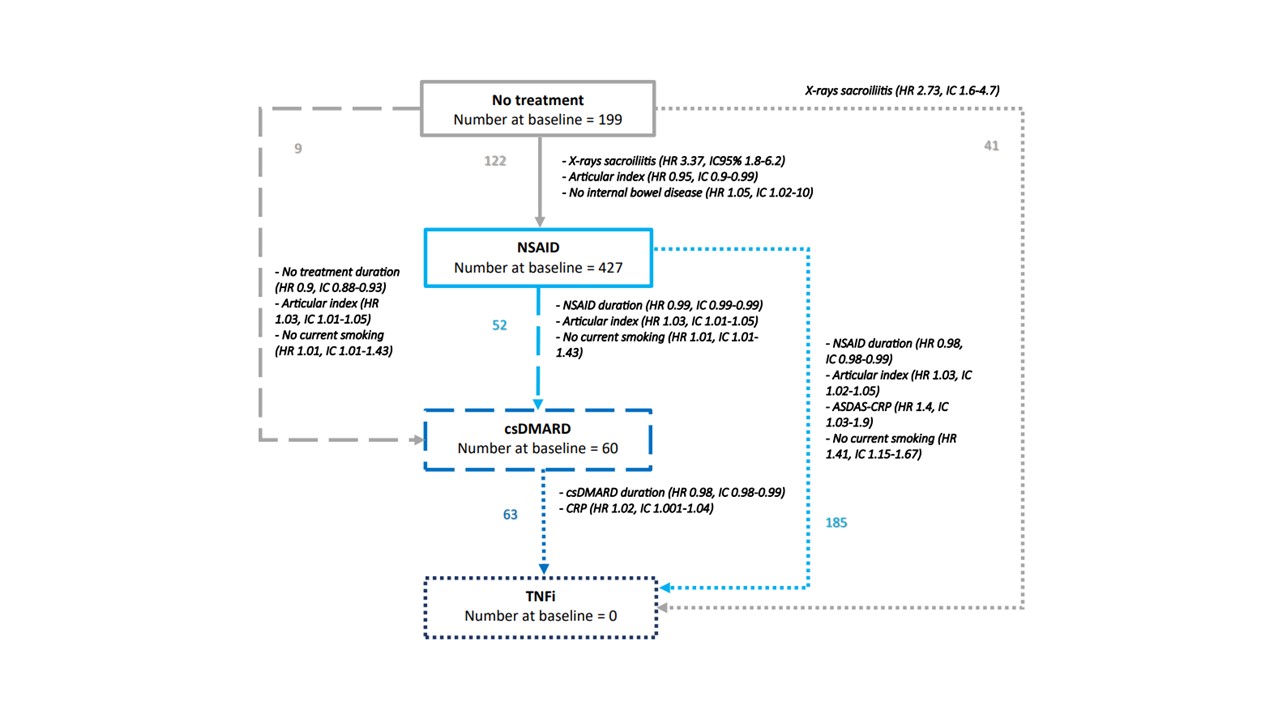Session Information
Date: Sunday, November 12, 2023
Title: (0510–0542) Spondyloarthritis Including Psoriatic Arthritis – Treatment: AxSpA Poster I
Session Type: Poster Session A
Session Time: 9:00AM-11:00AM
Background/Purpose: Current recommendations for the management of patients with axial spondyloarthritis (axSpA) emphasize the need of individualized strategy in the therapeutic decision. Thus, many factors seem to impact this strategy.
The objectives of the study were to describe the therapeutic strategies observed in axSpA, and to assess the factors associated with treatment changes over time.
Methods: This study included patients with axSpA from the French prospective cohort DESIR, with a scheduled 10-year follow-up. A multi-state model with 4 ordered treatment states (“none”, “non-steroidal anti-inflammatory drugs (NSAID)”, “conventional synthetic DMARD (csDMARD)”, “TNF inhibitors (TNFi)”) was defined, with 6 possible transitions. Estimation of the restricted mean sojourn times spent in each state from the state occupation probabilities was performed. Then, predictors of those transitions were assessed by multivariable Cox models.
Results: 686 (96.9%) of the 708 patients who had more than one visit were analyzed. At cohort entry, 199 (29.0%) were untreated, 427 (62.2%) received NSAID, and 60 (8.7%) received csDMARD and none TNFi.
Over the 10 years of follow-up, patients mostly received NSAID (46.4% of the time) followed by TNFi (24.4% of the time). In multivariable analysis (figure), presence of sacroiliitis on radiography, internal bowel disease and articular index were associated with transition to NSAID. Duration in the previous state was often a significant protective factor associated with transition to csDMARD or TNFi. Finally, the several disease activity outcomes were associated with most transitions.
Conclusion: This was the first study using a multistate model to easily represent the different states, detailing the transitions across them, and their associated factors. Different time profiles of axSpA patient management were identified, including abstention up to a significant proportion of patients treated with csDMARD.
NSAID refers to non-steroids anti-inflammatory drugs, csDMARD stands for conventional synthetic Disease Modifying Anti-Rheumatic Drug, and TNFi for tumor necrosis factor inhibitors.
To cite this abstract in AMA style:
Portier E, chevret S, Ruyssen-Witrand A, Walter-Petrich A, Dougados M, Molto A. Factors Associated with Treatment Pathways in Early Axial Spondyloarthritis: A Multistate Analysis of the 10-year Follow-up of the DESIR Cohort [abstract]. Arthritis Rheumatol. 2023; 75 (suppl 9). https://acrabstracts.org/abstract/factors-associated-with-treatment-pathways-in-early-axial-spondyloarthritis-a-multistate-analysis-of-the-10-year-follow-up-of-the-desir-cohort/. Accessed .« Back to ACR Convergence 2023
ACR Meeting Abstracts - https://acrabstracts.org/abstract/factors-associated-with-treatment-pathways-in-early-axial-spondyloarthritis-a-multistate-analysis-of-the-10-year-follow-up-of-the-desir-cohort/

